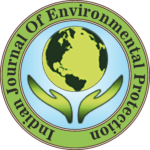IJEP 42(1): 80-87 : Vol. 42 Issue. 1 (January 2022)
M. Avinash1, I. Sudhakara Rao2, S. Raminaidu3 and H. Ramamohan1*
1. Aditya Institute of Technology and Management, Department of Civil Engineering, Tekkali – 523 001, Srikakulam, Andhra Pradesh, India
2. Aditya Institute of Technology and Management, Department of Environmental Studies, Tekkali – 523 001, Srikakulam, Andhra Pradesh, India
3. Sri GCSR College of Educatiion, Department of Botany, Razam – 532 127, Andhra Pradesh, India
Abstract
Monitoring and managing groundwater quality is of major environmental distress. Inadequate availability of surface water makes people dependent on groundwater to accomplish their needs. Hence, it cannot be optimally used and sustained unless the quality is assessed. Quality assessment, can be done using water quality index (WQI), is a mathematical expression applied to transform large quantity of data into a single number which indicates the level of water quality. The present study is intended to evaluate the quality and suitability of groundwater for potable use during 2019–2020. The study evaluates the physico-chemical parameters, such as EC, TDS, pH, alkalinity, Ca, Fe, NH4, NO2, NO3, Cl and PO4 remained used for the assessment. Geographical coordinates were obtained using GPS receiver for continuous monitoring. The results revealed that the WQI of groundwater at the focused area is 28.84 and stipulates that the water is good for drinking purpose as comes under excellent category. The study delivers comprehensive depiction which is easily interpretable in lieu of the decision makers for better planning and management of water resources along with their development methods are elaborated.
Keywords
Groundwater, Water quality parameters, Water quality index, Water quality assessment, GPS receiver
References
- IS 10500. 2012. Specification for drinking water (second revision). Bureau of Indian Standards, New Delhi.
- Ramamohan, H., et al. 2016. Assessment and substantiation of groundwater quality to ascertain WQI in some selected areas of northeast coast of Srikakulam district, A.P., India. 6(5): 867-882.
- Kumar, M. and R. Kumar. 2013. Assessment of physico-chemical properties of groundwater in granite mining area in Goramachia, Jhansi, U.P., India. Int. Res. J. Env. Sci., 2(1): 19-24.
- Ramamohan, H., I. Sudhakar and S.V.M. Prasad. 2019. Groundwater quality and its role in endemic kidney diseases- A case study at northeast coast (Uddanam) of Srikakulam district. Indian J. Env. Prot., (39)8: 719-727.
- Brown, R.M., et al. 1970. A water quality index: Do we dare? Water Sewage Works. 117(10): 339-343.
- Tyagi, S., et al. 2013. Water quality assessment in terms of water quality index. American J. Water Resour., 1(3): 34-38.
- Shivasharanappa, P.S. and M.S. Huggi. 2011. Assessment of groundwater quality using water quality index at Bidar city, Karnataka. Int. J. Env. Sci., 2(2): 965-976.
- Horton, R.K. 1965. An index number for rating water quality. J. Water Poll. Control Federation. 37(3): 300-306.
- Tiwari, T.N. and M.A. Mishra. 1985. A preliminary assessment of water quality index of major Indian rivers. Indian J. Env. Prot., 5:276-279.
- Rajankar, P. 2013. Assessment of groundwater quality using water quality index (WQI) in Wardha Maharashtra. J. Env. Sci. Sustain., 1(2):49-54.
- Steinhart, C.E., L.J. Schierow and W.C. Sonzogni. 1982. Environmental quality index for the Great Lakes. Water Res. Bull., 18(6): 1025-1031.
- Bhargava, D.S. 1983. Use of water quality index for river classification and zoning of Ganga river. Env. Poll. Ser. B. England. 6(1): 51-67.
- Ongley, E. 1998. Modernization of water quality programs in developing countries: Issues of relevancy and cost efficiency. Water Qual. Int., 3(4): 37-42.
- Jena, V., S. Dixit and S. Gupta. 2013. Assessment of water quality index of industrial area surface water samples. Int. J. Chem. Tech. Res., 5(1): 278-283.
- Ott, W.R. 1978. Environmental indices: Theory and practice. Ann Arbor Science Publishers Inc., Ann Arbor.
- DEQ. 2003. Water quality index. The Oregon Department of Environmental Quality. Available at: http:// www.deq.state.or .us/ lab/ WQM/ WQI/ Wqi main.htm.
- Harkins, R.D. 1974. An index number system for rating water quality. J. Water Poll. Cont. Fed., 46(7): 588.
- Marta, T., B. Damià and T. Romà. 2010. Surface water quality indices for the analysis of data generated by automated sampling networks, TrAC trends. Anal. Chem., 29(1): 40-52.
- CGWB. 2013. Groundwater brochure, Srikakulam district, Andhra Pradesh. Central Groundwater Board, Ministry of Water Resources, Government of India.
- APHA/AWWA/WEF. 1998. Standard methods for the examination of water and wastewater (20th edition). American Public Health Association/American Water Works association, Water Environment Federation, Washington DC, USA. pp 235-237.
- WHO. 2017. Guidelines for drinking water quality (4th edn). World Health Organization, Geneva.
- Brown, R.M., et al. 1972. Water quality index-Crossing the psychological barrier. Proceedings of the International Conference on Water pollution research, Jerusalem. pp 787-797.
- Mufid, A. 2012. Application of water quality index to assess suitability of groundwater quality for drinking purposes in Ratmao-Pathri Rao watershed, Haridwar district, India. American J. Sci. Ind. Res., 3(6): 395-402.
